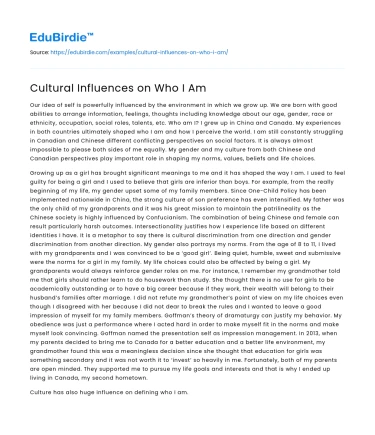Our idea of self is powerfully influenced by the environment in which we grow up. We are born with good abilities to arrange information, feelings, thoughts including knowledge about our age, gender, race or ethnicity, occupation, social roles, talents, etc. Who am I? I grew up in China and Canada. My experiences in both countries ultimately shaped who I am and how I perceive the world. I am still constantly struggling in Canadian and Chinese different conflicting perspectives on social factors. It is always almost impossible to please both sides of me equally. My gender and my culture from both Chinese and Canadian perspectives play important role in shaping my norms, values, beliefs and life choices.
Growing up as a girl has brought significant meanings to me and it has shaped the way I am. I used to feel guilty for being a girl and I used to believe that girls are inferior than boys. For example, from the really beginning of my life, my gender upset some of my family members. Since One-Child Policy has been implemented nationwide in China, the strong culture of son preference has even intensified. My father was the only child of my grandparents and it was his great mission to maintain the patrilineality as the Chinese society is highly influenced by Confucianism. The combination of being Chinese and female can result particularly harsh outcomes. Intersectionality justifies how I experience life based on different identities I have. It is a metaphor to say there is cultural discrimination from one direction and gender discrimination from another direction. My gender also portrays my norms. From the age of 8 to 11, I lived with my grandparents and I was convinced to be a ‘good girl’. Being quiet, humble, sweet and submissive were the norms for a girl in my family. My life choices could also be affected by being a girl. My grandparents would always reinforce gender roles on me. For instance, I remember my grandmother told me that girls should rather learn to do housework than study. She thought there is no use for girls to be academically outstanding or to have a big career because if they work, their wealth will belong to their husband’s families after marriage. I did not refute my grandmother’s point of view on my life choices even though I disagreed with her because I did not dear to break the rules and I wanted to leave a good impression of myself for my family members. Goffman’s theory of dramaturgy can justify my behavior. My obedience was just a performance where I acted hard in order to make myself fit in the norms and make myself look convincing. Goffman named the presentation self as impression management. In 2013, when my parents decided to bring me to Canada for a better education and a better life environment, my grandmother found this was a meaningless decision since she thought that education for girls was something secondary and it was not worth it to ‘invest’ so heavily in me. Fortunately, both of my parents are open minded. They supported me to pursue my life goals and interests and that is why I ended up living in Canada, my second hometown.
Save your time!
We can take care of your essay
- Proper editing and formatting
- Free revision, title page, and bibliography
- Flexible prices and money-back guarantee
Culture has also huge influence on defining who I am. There are some significant differences between Chinese charity culture and Canadian charity culture. And this was a complete cultural shock for me and it keeps on challenging my beliefs and values. School is another agent of socialization. The competitive Chinese education puts academic scores and grades above anything else. Unique to Chinese education, the final year of their high school is dedicated to taking a national final test, that is the only one which determines what kind of college they can attend. The test makes the future. For students in high schools, it is above anything else. In China, philanthropy was never really in people’s values because we are always busy with our own business and we are always facing huge competition. There is only self-interest that motivates people, so charity is not a common activity among Chinese people. When I was in China, I did not have any idea of charity actions. I was self-centered just like others. However, in Canada, we proudly promote the value of making a contribution to society without compensation. When I first attended my high school, I was the only one who was poor in both French and English, I was impressed when my school decided to offer me free tutoring in both languages and some special care. I was shocked by the amount of work in promoting the ‘Canadian values’ in the Canadian education: love, tolerance, acceptance, multiculturalism, equality, etc. As a receiver of charity from school, I felt extremely motivated by all those new elements of my worldview, therefore, I participated in a humanitarian trip project in Benin (West Africa) with my high school and that was definitely one of the most unforgettable experiences in my life. It gave me a chance to immerse myself in a foreign culture when giving back in a meaningful way.
I love Canada, the country that brings me a better living environment and a better education. However, I have never forgotten the fact that I was born and raised in China. The splendid Chinese culture was imprinted on my mind. It is a big chunk of my worldview. Despite the fact that China needs some improvements in certain domains, I am still so proud of being Chinese.






 Stuck on your essay?
Stuck on your essay?

